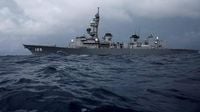Japan is set to export six used naval destroyers to the Philippines in a strategic move aimed at strengthening deterrence against China's growing maritime ambitions, according to a report by the Japanese newspaper Yomiuri on Sunday, July 6, 2025. This development marks a significant step in bolstering cooperation between two key U.S. allies in the Indo-Pacific region as tensions with Beijing continue to rise.
The destroyers, identified as 'Abukuma' class escort vessels, have served in the Japanese Maritime Self-Defense Force for over 30 years. While these ships are not the newest in Japan’s naval inventory, their transfer to the Philippine military represents a meaningful enhancement in Manila's maritime defense capabilities, particularly in light of the persistent challenges posed by China’s assertive activities in regional waters.
Sources within the Japanese government, who preferred to remain unnamed, revealed that the plan to export these six destroyers was agreed upon during a meeting between the Japanese and Philippine defense ministers in Singapore in June 2025. The Philippine army is expected to conduct inspections of the vessels during the summer as part of final preparations before the transfer is finalized.
This move is emblematic of a broader strategic alignment between Tokyo and Manila, both of which have expressed concerns over Beijing’s increasingly aggressive maneuvers in contested maritime zones. For the Philippines, the South China Sea remains a flashpoint, with China’s expansive territorial claims and island-building activities threatening Manila’s sovereignty and access to vital sea routes. Similarly, Japan faces its own maritime challenges in the East China Sea, where disputes over islands and freedom of navigation have heightened regional tensions.
Despite the significance of the deal, official responses have been notably restrained. A spokesperson for Japan’s Ministry of Defense declined to comment on the report, while representatives from the Philippine army and China’s Foreign Ministry have yet to respond to requests for comment. This silence underscores the sensitive nature of the transaction, which unfolds against a backdrop of complex geopolitical dynamics in the Indo-Pacific.
Japan’s decision to export these used destroyers to the Philippines fits within a larger framework of U.S.-led efforts to strengthen alliances and partnerships in the region as a counterbalance to China’s maritime expansion. By enhancing the naval capabilities of the Philippines, Japan not only deepens bilateral ties but also contributes to a collective deterrence posture aimed at preserving freedom of navigation and regional stability.
The 'Abukuma' class escort destroyers, while aging, are still capable vessels equipped for a range of maritime defense tasks. Their transfer will provide the Philippine navy with enhanced escort and patrol capabilities, allowing for better protection of its territorial waters and maritime interests. Given the Philippines’ limited naval assets, this acquisition could be a game-changer in its ongoing efforts to assert sovereignty in the South China Sea.
Observers note that Japan’s move also reflects its evolving security posture. Historically constrained by its pacifist constitution, Japan has been gradually expanding its defense cooperation with allies and partners. This export of naval assets is a tangible example of Tokyo’s willingness to take a more proactive role in regional security affairs, especially in collaboration with countries that share concerns over China’s rise.
For the Philippines, the acquisition comes at a critical juncture. Manila has faced increasing pressure from Beijing’s assertiveness, including incidents involving Chinese coast guard and fishing vessels in disputed waters. Strengthening its naval capabilities through such acquisitions is seen as vital to safeguarding national interests and maintaining a credible defense deterrent.
While the exact timeline for the transfer remains subject to the completion of inspections and final agreements, the planned inspections this summer indicate that both sides are moving forward with a sense of urgency. The deal also signals a deepening of the security relationship between Japan and the Philippines, which share not only strategic concerns but also longstanding diplomatic ties.
As the Indo-Pacific continues to be a hotspot for geopolitical competition, moves like this one highlight the complex balancing act regional players must perform. Japan and the Philippines are seeking to assert their sovereignty and protect their maritime domains without escalating tensions unnecessarily. Yet, the transfer of military assets inevitably sends a strong message to Beijing about the resolve of these nations to defend their interests.
In the broader context, this development is part of a pattern of increased military cooperation among U.S. allies and partners in the region. With China’s naval expansion showing no signs of slowing, countries like Japan and the Philippines are compelled to enhance their defense capabilities and work more closely together. This collaboration not only serves their national interests but also contributes to a collective security architecture aimed at deterring unilateral actions that could destabilize the region.
In sum, Japan’s export of six used 'Abukuma' class destroyers to the Philippines represents a significant step in regional defense cooperation. It underscores the shared concerns over China’s maritime activities and the determination of U.S. allies to strengthen deterrence through tangible military support. As the Philippine navy prepares to inspect these vessels this summer, the move signals a deepening alliance and a clear message of resolve amid the shifting tides of Indo-Pacific geopolitics.




